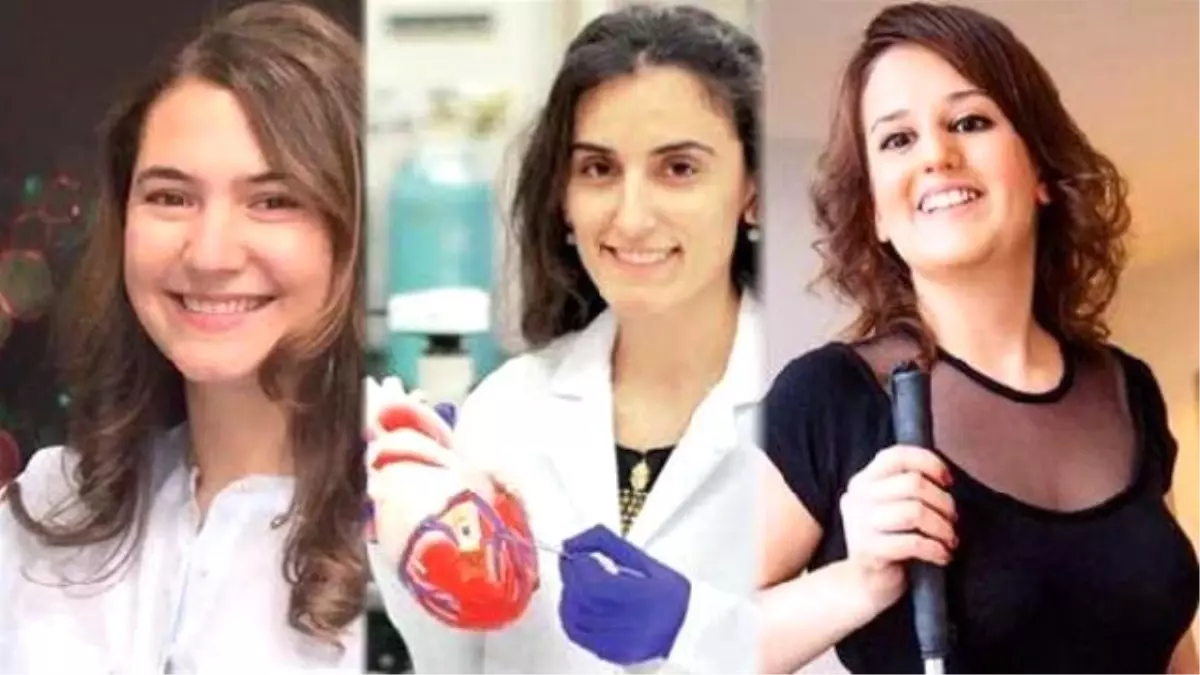The Three Most İnnovative Turkish Women Of 2015

The Massachusetts Institute of Technology's (MIT) Technology Review magazine has included three Turkish women in its "35 Innovators Under 35" list this year.
The Massachusetts Institute of Technology's (MIT) Technology Review magazine has included three Turkish women in its "35 Innovators Under 35" list this year. The list includes 35 inspiring inventors, entrepreneurs, visionaries, humanitarians and pioneers from around the world. Meet Duygu Kayaman, Gözde Durmuş and Canan Dağdeviren.
One of the nine names in the "inventors" section of the list is Canan Dağdeviren, thanks to her ground-breaking work in medical technology.
After her graduation from Sabancı University in Istanbul in 2009, Dağdeviren completed her PhD in materials science and engineering at the University of Illinois, Urbana-Champaign, with a Fulbright scholarship. Dağdeviren is now a junior fellow at Harvard University's Society of Fellows (SoF) and a post-doctoral associate at MIT.
Her innovations include a flexible sensor capable of measuring skin quality and a device that can replace cardiac pacemaker batteries.
Dağdeviren's sensor is considered a big step in the early diagnosis of skin cancer. The device can be permanently implanted inside a person's body to harvest energy from the movements of organs and serve as a battery for cardiac pacemakers, which now need to be surgically replaced every five to eight years.
"I'm very happy to be on this prestigious list and represent my beautiful country" she told daily Hürriyet in a recent interview.
"It excited me to have the opportunity to meet young researchers working in different fields. It is a wonderful platform to meet people and collaborate on promising projects. It is good that success is being recognized and rewarded. I think such lists are vital to raise scientific awareness and make young people believe that they can also succeed.
"I am now working on a needle-shaped battery to help people with Parkinson's disease or other brain diseases. Last week, we conducted tests on monkeys and they were successful. The device can reach remote sections of the brain and detect injured cells. We will then be able to cure those cells with different medicines.
"Currently we take medicine through our mouths or veins. This has an unnecessary impact on our bodies. However, we can access part of the brain with this thin device and medicate a patient in a controlled manner."
"My Dream Partner" by Duygu Kayaman
Duygu Kayaman, 26, is another woman on the list; she was placed in the "humanitarians" category. As a visually impaired person herself, Kayaman aims to help others with disabilities through an application she developed called "My Dream Partner." The app enables visually impaired persons to reach daily news, listen to audio books and have access to education.
Kayaman, who works for Microsoft as a sales expert, said it was "meaningful" for MIT to include her on the list.
"'My Dream Partner' became the winner of the GSMA Mobile World Congress last year and now MIT has selected it as one of the world's best innovations. I find this very meaningful because it exemplifies that Turkish youth can collaborate and innovate," she said.
"We achieved a lot more than previously expected by working in cooperation with over a hundred members of the Young Guru Academy [YGU] - an international organization aiming to raise innovative and socially responsible leaders. We continue to improve our application as technology progresses. Our next goal is to develop a new technology enabling visually impaired persons to watch audio films in movie theaters. Visually impaired persons will be able to listen to films via 'My Dream Partner.' The app will portray the film using voice recognition technology. This will be a first.
"Furthermore, we are trying to spread the use of an app which enables visually impaired persons to find their direction inside shopping malls. When I was young, it was very difficult to find audio books. Since I loved reading, my friends and family compensated for my lack of books, they used to read for me. That is how I prepared for high school and university entrance exams. 'My Dream Partner' is an outcome of my experiences."
Cellular diagnosis with air by Gözde Durmuş
Gözde Durmuş, a 30-year-old scientist at the Stanford Genome Technology Center, is one of nine people on the list's "pioneers" category. Durmuş has innovated a simple method to detect cells' physical characteristics. Her magnetic cell detector levitates cells in a magnetic field and measures their rise. Durmuş discovered that if a cell is responding well to an antibiotic, it tends not to rise as high. Unlike the traditional method that takes a day to detect the effect, Durmuş' method needs only an hour, what's more, each test costs less than a dollar.
Durmuş stated making it on the list has motivated her immensely.
"As a scientist, I feel proud that my entrepreneurship is being rewarded. I dreamt of being a scientist since I was a kid. I love working at the laboratory and I believe my efforts, alongside my family's efforts, are paying off. Ten percent of this list of 35 people is Turkish. And this list is a big deal in the United States. It's what all young scientists dream of. I have been receiving congratulations from my friends at different universities," she said.
"During my studies at Stanford, I developed a technology that can detect biological changes in cells in a fast and simple manner. It is also low-cost. The most exciting aspect is the result of this innovation. Before, it took a few days to detect the effects of antibiotics on cells. Now, it takes only an hour. If you go to a hospital, it requires days to find the correct antibiotic for a disease. I can say I developed this technology based on my own experiences as a patient.
"There is a 50 percent chance that prescribed antibiotics are unnecessary or wrong. This is one of the primary reasons of the spread of infectious, incurable diseases that are resistant to antibiotics. This device can find the appropriate antibiotic within an hour. We also got positive results in detecting cancer cells and developing personalized treatment.
"This device is also expected to be used in monitoring and treating Thalassemia, which is frequently observed in Turkey. We continue to work on blood samples arriving from Turkey.
"The device is not on the market yet for widespread use. However, it will soon become accessible once the necessary tests are complete. My dream is to make this device readily available for patients in their homes.
"As the daughter of a teacher mother and engineer father, I want to demonstrate that success is possible after graduating from a Turkish university. Fellow science-lovers should read a lot and preserve their curiosity because scientific fields are now closely aligned. They should not feel limited in their own fields. They should not have boundaries."
(Photo) - Istanbul









